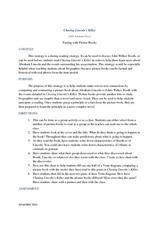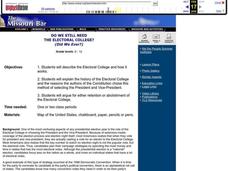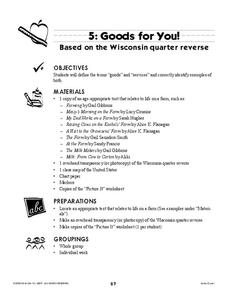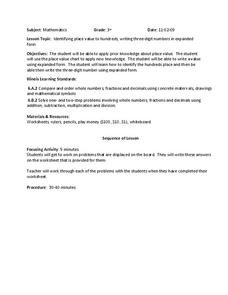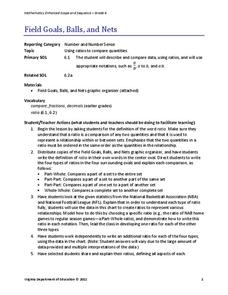Curated OER
Enjoying the Adventure
Students watch the video of "The Prince and the Pauper" and analyze, compare and contrast the characters. They write letters to a character from the point of view of another character and create a new ending to the play.
Curated OER
Pumpkin Problems
Students participate in a lesson that has the intention of working on estimation skills. They use pumpkins to estimate the number of seeds are inside. They collect data for each pumpkin and compare it to the estimation. Students question...
Curated OER
Investigation - The Local Bagel Shop
Sixth graders investigate unit pricing to find which cup of coffee is a better buy. They use ratio and proportions to solve problems involving a change of scale in drawings, maps, recipes, etc. Students determine the unit cost of items...
Curated OER
Cops and Robbers
Second graders observe the teacher model writing a letter to the author of the book, COPS AND ROBBERS. They then compare the story structure of the book to those of FUNNYBONES and identify the setting, characters and theme.
Curated OER
How Much Do You Burn?
Sixth graders discover their weight relative to the other children in their class. They determine how many calories they burn through exercise and compare it with their classmates. Using the internet, they calculate their body mass index...
Curated OER
Race and Ethnicity in the United States
High schoolers explore race and ethnicity as it is defined by the U. S. Census Bureau. They compare data from 1900, 1950, and 2000 and identify settlement patterns and changes in population. In groups, they map these changes and discuss...
Curated OER
The Iceberg
Students consider Mongolian and American cultural features. In this global studies activity, students compare an iceberg to cultural features as they brainstorm and discuss visible and invisible cultural features.
Curated OER
Pairing with Picture Books: Chasing Lincoln's Killer
Readers of Chasing Lincoln’s Killer, James L Swanson’s young adult novel, use a Venn diagram to compare information about Abraham Lincoln and the events surrounding his assassination, with the images and information presented in picture...
Curated OER
Do We Still Need the Electoral College?
One of the most confusing aspects of any presidential election year is the role of the Electoral College. Learners read a bit about how the Electoral College works and then they hold a mock election in their classroom. They'll redraw a...
Curated OER
Manufacture of Cheese
Students examine the steps and safety procedures in the cheese making process. They make and taste a variety of cheeses comparing their properties.
Curated OER
Working with Percentages
Learners complete basic operations using percentages in a variety of real world situations. Discounts are computed and compared to a variety of prices listed in local newspaper advertisements.
Curated OER
Manduca
Students investigate the basic survival needs of both hornworms and humans. They compare and contrast the them by making a class list.
Curated OER
Kaffee - und Teegesellschaften: German Foods
Introduce your Language students to the culture and 19th century German custom of serving coffee and cake at small parties. They read old cookbooks, sort recipes, prepare foods, compare old German recipes to recipes from home and convert...
Curated OER
Why Does the Cocoa Tree Need a Tropical Rainforest to Grow?
Fourth graders explore the requirements a cocoa plant needs to survive. They research where chocolate comes from and how humans can affect the growth of cocoa trees. Students create a 3-D model of a cocoa tree and compare and contrast...
Curated OER
Catch a Wave. . .
Part of a larger online space science website, this page has a brief explanation of electromagnetic radiation and a chart of wavelengths as compared to common objects. There are four questions to answer about the information. This can be...
Curated OER
Culture Is Like an Iceberg
Learners examine cultural traditions. In this culture lesson, students compare invisible and visible features of culture as they complete an iceberg-themed worksheet.
Curated OER
What's Organic?
Students discuss background information presented by the teacher and read dictionary definitions for the words "organic" and "synthetic." In this gardengin lesson, students complete a worksheet on the material. Students grow and compare...
Curated OER
Past and Present
Providing an interesting way to discuss the U.S. presidency, this lesson has learners compare George Washington to the current president. They listen to books about George Washington, discuss the current president, and complete worksheets.
Curated OER
Goods for You!
Have your class learn about Wisconsin and farming. Learners begin by listening to stories that describe farming and engage in a discussion of goods and services. They could also compare the goods and services provided in different states.
Curated OER
Math: Football League Statistics
Students examine a soccer league final standings chart and then answer 12 questions based on the information provided. They calculate some answers in both fractions and percentages.
Curated OER
Identifying Place Value
Third graders complete math problems. In this place value activity, 3rd graders solve problems that require them to write the place value of a number in expanded form and identify the place value and expanded form of three digit numbers.
Curated OER
Charting Attendance Rate of Busch Gardens
Sixth graders, in groups, are given different parts of the whole project. They use information from Busch Gardens to explore line graphs, averages, and other math vocabulary.
Curated OER
2.0 "Water Is Life" Global Water Awareness Mini-Unit (Grades3-5)
Students study the amount of potable water on the Earth. In this water lesson, students examine the amount of potable water as compared to all the water on the Earth. They discuss why many parts of the world do not have access to good...
Virginia Department of Education
Field Goals, Balls, and Nets
Score a resource on ratios. Young mathematicians learn about different ways to express ratios. Using sports data, they write statements about the statistics in ratio form.









